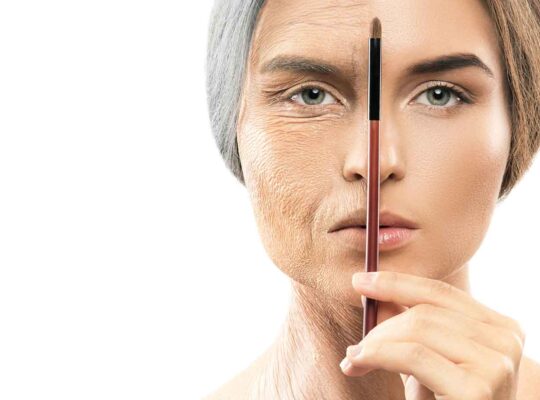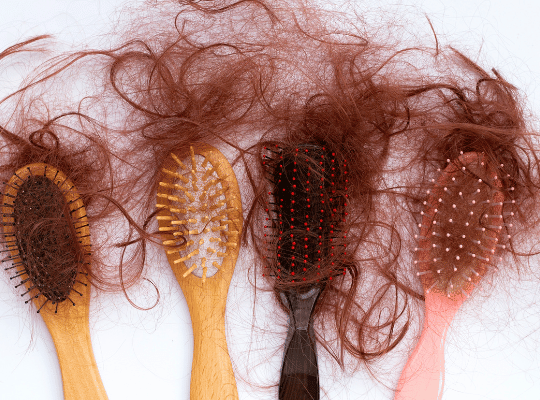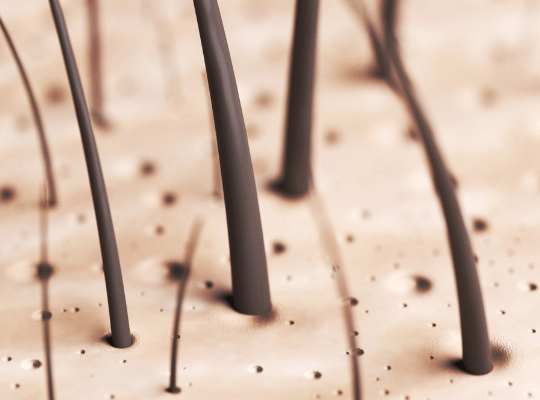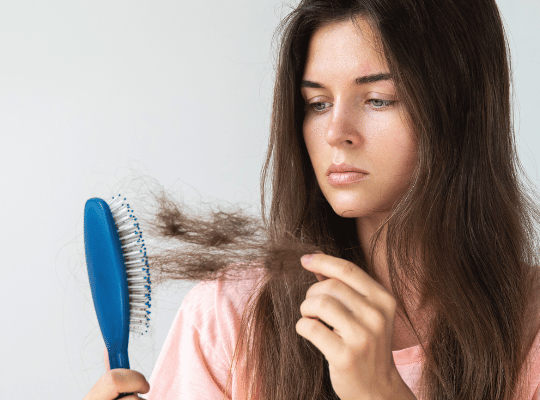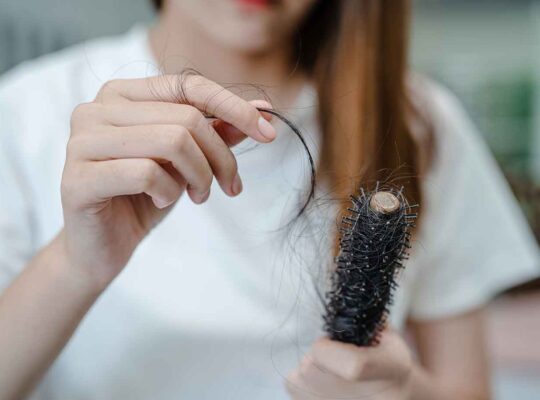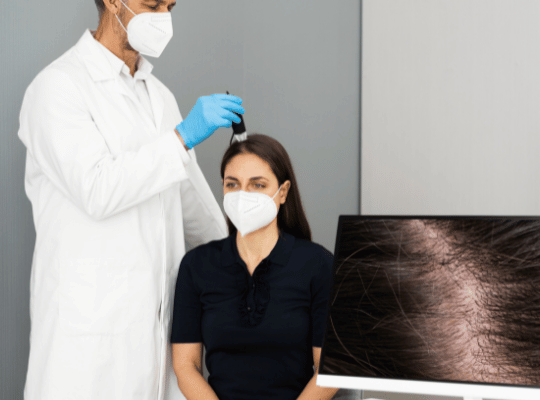Navigating Hair Loss During Your Weight Loss Journey: Causes, Prevention, and Solutions
Have you ever noticed that while shedding those extra pounds, you might also be losing a bit more hair than usual? This can be quite alarming, especially when you’re focused on getting healthier through weight loss. Many people don’t realize that losing weight can sometimes lead to hair loss, making it a double-edged sword. Understanding why this happens and what you can do about it is crucial for anyone on a weight loss journey who wants to maintain a healthy head of hair.
Understanding the Link Between Weight Loss and Hair Loss
Physiological Changes: How Your Body Reacts to Rapid Weight Loss
When you start losing weight quickly, your body goes through a lot of changes. These changes are not just about shrinking waistlines but also involve complex physiological reactions. One of the most significant effects is nutritional deficiencies. If you’re not getting enough of the right nutrients, your hair might suffer. Your body prioritizes vital organs like your heart and brain over hair growth, so if you’re lacking in nutrients, your hair is often the first to feel the impact.
Moreover, stress plays a big role here. Rapid weight loss can be a form of physical stress, and your body might react by shifting more hair follicles into the resting phase, known as the telogen phase, which eventually leads to hair shedding.
Telogen Effluvium: The Temporary Hair Loss Caused by Weight Loss
A common type of hair loss associated with weight loss is called telogen effluvium. This is a temporary condition where more hair than usual enters the telogen phase of the hair growth cycle. Normally, about 5-10% of your hair is in this phase at any given time, but when you experience telogen effluvium, that number can rise significantly, leading to noticeable hair shedding. Fortunately, telogen effluvium is usually temporary, and hair growth often resumes once your body adjusts.
Common Causes of Hair Loss During Weight Loss
Nutritional Deficiencies: Why Hair Needs More Than Just Calories
Your hair needs a variety of nutrients to stay strong and healthy. When you cut calories, especially if you’re following a very restrictive diet, you might not be getting enough of the essential nutrients your hair needs, such as:
- Iron: Low iron levels can cause anemia, which is a common cause of hair loss.
- Zinc: This mineral helps with hair tissue growth and repair.
- Protein: Hair is primarily made of protein, so not consuming enough can weaken your hair and slow down its growth.
- Vitamins: Vitamins like biotin, vitamin D, and B-vitamins are crucial for hair health.
If your diet is lacking in these nutrients, your hair may become brittle, thin, and more prone to falling out.
Caloric Restriction: How Cutting Too Many Calories Can Backfire
While reducing calories is essential for weight loss, severe caloric restriction can actually cause more harm than good, especially when it comes to your hair. When you significantly cut down on calories, your body may go into a state of shock, which can disrupt your normal hair growth cycle. This is because your body might start conserving energy by slowing down processes that it considers non-essential, such as hair growth.
Stress and Hormonal Changes: The Hidden Culprits Behind Hair Loss
Losing weight, especially rapidly, can be stressful—not just emotionally but physically too. This stress can lead to hormonal changes that further exacerbate hair loss. For instance, stress can increase levels of cortisol, a hormone that can disrupt the hair growth cycle. Additionally, weight loss can affect your thyroid function, which plays a crucial role in regulating hair growth. An underactive thyroid (hypothyroidism) can lead to hair thinning and shedding.
Preventing Hair Loss While Losing Weight
Balanced Diet: Eating Right While Shedding Pounds
The key to losing weight without sacrificing your hair is to ensure that your diet remains nutrient-rich even when you’re cutting calories. Here are some tips to maintain a balanced diet:
- Include Protein: Make sure to include enough protein in your diet. Lean meats, eggs, nuts, and legumes are excellent sources of protein.
- Eat a Variety of Foods: Incorporate a wide range of fruits, vegetables, whole grains, and healthy fats to ensure you’re getting all the necessary vitamins and minerals.
- Don’t Skip Meals: Instead of drastic calorie cuts, aim for smaller, balanced meals throughout the day to keep your energy and nutrient levels steady.
Gradual Weight Loss: Why Slow and Steady Wins the Race
When it comes to weight loss, slow and steady is not just a saying—it’s a key strategy for preventing hair loss. Gradually losing weight allows your body to adjust without the shock that can trigger telogen effluvium. Experts recommend aiming for a weight loss of about 1-2 pounds per week. This pace is generally safe and helps ensure that your body continues to receive the nutrients it needs.
Supplements and Vitamins: Giving Your Hair the Extra Support It Needs
In addition to a balanced diet, taking supplements can help support hair health during your weight loss journey. Here are a few to consider:
- Biotin: Often recommended for hair growth, biotin can strengthen hair and promote growth.
- Iron: If your iron levels are low, taking an iron supplement can help prevent hair loss.
- Multivitamins: A good multivitamin can fill in any gaps in your diet, ensuring you get the essential nutrients your hair needs.
Before starting any new supplements, it’s a good idea to consult with a healthcare provider to ensure they’re appropriate for you.
Solutions and Treatments for Hair Loss
Topical Treatments: Products That Can Help Regrow Hair
If you’re already experiencing hair loss, there are topical treatments available that can help promote hair regrowth. One of the most common treatments is Minoxidil, an over-the-counter medication that can be applied directly to the scalp. Minoxidil works by increasing blood flow to the hair follicles, which can help to stimulate hair growth and slow down hair loss.
Professional Advice: When to See a Healthcare Provider
If your hair loss is severe or you’re concerned about it, it’s important to seek professional advice. A healthcare provider or dermatologist can help determine the underlying cause of your hair loss and recommend the best treatment options. They might conduct blood tests to check for nutritional deficiencies or hormonal imbalances and suggest specific treatments based on the results.
Lifestyle Adjustments: Small Changes for Big Improvements
Making some lifestyle adjustments can also help prevent further hair loss and promote regrowth. Here are a few tips:
- Reduce Stress: Incorporate stress-reducing activities into your daily routine, such as yoga, meditation, or simply taking time to relax.
- Proper Hair Care: Be gentle with your hair. Avoid excessive heat styling, tight hairstyles, and harsh chemicals that can damage your hair.
- Regular Exercise: Regular physical activity can help improve circulation, including to your scalp, which supports hair health.
Conclusion
Losing weight is a great goal, but it’s important to do it in a way that doesn’t compromise your hair health. By understanding the link between weight loss and hair loss, and taking steps to prevent it, you can achieve your weight loss goals while maintaining a healthy head of hair. Remember to eat a balanced diet, lose weight gradually, and consider supplements if needed. And if you’re experiencing significant hair loss, don’t hesitate to seek professional advice.
Achieving your desired weight and keeping your hair healthy is possible with the right approach!
FAQs About Weight Loss and Hair Loss
- Why does hair fall out when you lose weight?
- Hair can fall out due to nutritional deficiencies, stress, and hormonal changes that occur during rapid weight loss.
- Can losing weight slowly prevent hair loss?
- Yes, gradual weight loss helps prevent shock to your system, which can reduce the risk of hair loss.
- What nutrients are important to prevent hair loss during weight loss?
- Nutrients like iron, zinc, protein, and vitamins such as biotin and vitamin D are crucial for maintaining healthy hair.
- Is hair loss from weight loss permanent?
- In most cases, hair loss from weight loss is temporary, and hair typically regrows once your body adjusts.
- Should I take supplements to prevent hair loss while dieting?
- Taking supplements like biotin, iron, and a multivitamin can help, but it’s best to consult with a healthcare provider first.


